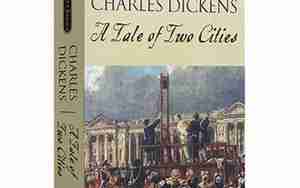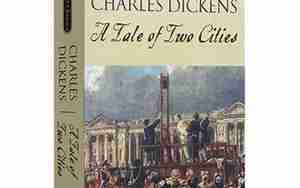
Title: Unfolding the Timeless Tale: A Glimpse into Charles Dickens' 'A Tale of Two Cities'
Introduction:
In the annals of literature, few works have captured the imagination and resonated with readers like Charles Dickens' "A Tale of Two Cities." This multi-layered narrative, set against the backdrop of the French Revolution, stands as a testament to the power of storytelling. Today, we delve into its profound wisdom, showcasing some of the timeless English quotes that have transcended generations, particularly those that resonate deeply with the hearts of the elderly. As we embark on this literary journey, let these extracts illuminate the bonds that unite us across time.
1. "It was the best of times, it was the worst of times, it was the age of wisdom, it was the age of foolishness, it was the epoch of belief, it was the epoch of incredulity, it was the season of Light, it was the season of Darkness,..." (Book 1, Chapter 1)
This opening sentence encapsulates the duality of the novel's setting, highlighting the contrast between the luxurious aristocracy and the struggling masses, a theme that speaks to the complexities of human nature and societal change.
2. "There are a thousand different ways of going to Hell, and all lead through Paris." (Book 2, Chapter 11)
For many老年人, this quote captures the sense of moral ambiguity and the chaotic nature of the French Revolution, reminding them of the moral choices we all face in life's turbulent times.
3. "Terror has its uses in the world, Mr. Lorry. One must know how to use it." (Book 3, Chapter 6)
This quote from Sydney Carton reflects on the darker side of revolution and the consequences of power, a thought-provoking reminder for older readers to navigate the grey areas of life with care.
4. "The good is never given up, the evil is never quite extinguished: they remain latent in each other." (Book 3, Chapter 13)
This profound statement speaks to the enduring struggle between good and evil, offering a timeless message that human nature and redemption are eternal themes.
5. "True gentility is never dainty nor affected, but is a steady and constant source of strength and comfort" (Book 1, Chapter 8)
The elegance of this quote serves as a gentle reminder to elderly readers that genuine compassion and kindness are qualities worth holding onto in life's trials.
In conclusion, "A Tale of Two Cities" is more than just a historical drama; it's a literary treasure trove of wisdom and emotion that touches the hearts of readers of all ages. For the elderly, these quotes serve as a reminder of the enduring relevance of Dickens' themes, from the complexities of human nature to the power of hope and redemption. Whether reading these words anew or revisiting them, the echoes of 'A Tale of Two Cities' reverberate long after the final page is turned.
双城记英语版美句摘抄
Title: Unveiling the Serene Beauty of 'A Tale of Two Cities': English Transcendence
Introduction:
Indelibly etched in the annals of English literature, Charles Dickens' "A Tale of Two Cities" stands as a beacon of profound prose, weaving a tapestry of emotions and insights. This masterpiece is filled with sentences that resonate with readers across generations, including those who hold a special admiration for the elegance and depth of the English language. Let's embark on a journey through its timeless quotes, discovering the magic that captivates even the most seasoned English lovers.
1. "There lives more history in one age of a man than in a thousand years of mankind." (Chapter 3, Book 1)
This snippet reveals the depth of character development in the novel, as it underscores the idea that personal experiences hold a profound significance that transcends time.
2. "To be born (or hatch) healthy, is the first essay toward happiness." (Chapter 1, Book 2)
This evocative line highlights the importance of a healthy start in life, a sentiment that resonates with the wisdom and experience of the elderly, reminding them of the significance of nurturing well-being.
3. "The best of all is yet to come." (Chapter 13, Book 3)
A beacon of hope, this quote provides comfort to readers, especially older ones, emphasizing that there is always room for growth and betterment in life.
4. "The law, in its majestic equality, forbids the rich as well as the poor to sleep under bridges, to beg in the streets, and to steal bread." (Chapter 2, Book 1)
This satirical gem, though humorous, exposes the harsh realities of social inequality, a theme that continues to resonate with readers, including those who have witnessed the complexities of society.
5. "The unquiet grave is the home of all that was once great and noble." (Chapter 11, Book 2)
A profoundly moving phrase, this quote serves as a poignant reminder of the fleeting nature of greatness and the impermanence of human pursuits.
In conclusion, "A Tale of Two Cities" is a treasure of English literary prowess, with its sentences resonating with elegance and depth. These extracts, especially those appreciated by the elderly, encapsulate the enduring power of Dickens' storytelling, exploring themes of hope, loss, and the human condition in a way that transcends time and generations. These phrases, like jewels within a literary crown, continue to shine brightly in the English language.
双城记经典英文语句
Title: Timeless Wonders: Classic Quotes from 'A Tale of Two Cities'
Introduction:
Distinguished by its profound insights and evocative language, Charles Dickens' "A Tale of Two Cities" has crafted a literary legacy that transcends generations. Here, we delve into some of its most经典的英文语句, which not only echo the power of storytelling but also resonate with readers, particularly elders, who appreciate the artistry and wisdom embedded within these lines.
1. "It was the best of times, it was the worst of times, it was the age of wisdom, it was the age of foolishness..." (Chapter 1, Book 1)
This iconic opening encapsulates the novel's theme of duality, introducing the stark contrast between the luxurious and oppressed societies of London and Paris.
2. "Tis better to remain silent and thought a fool, than to open one's mouth and remove all doubt." (Chapter 10, Book 2)
Reflecting on the power of words, this quote reminds us of the consequences of our actions and the importance of careful communication.
3. "Misery never comes alone; it always goes in flocks." (Chapter 6, Book 1)
This profound statement about the interconnectedness of human suffering highlights the resilience of the human spirit in the face of adversity.
4. "There is nothing new under the sun, but there isn't an old thing under it either." (Chapter 5, Book 3)
This paradoxical wisdom speaks to the eternal cycle of innovation and renewal, urging readers to embrace both the familiar and the unfamiliar in life.
5. "Promise me, my friends, I shall never forget you." (Chapter 13, Book 3)
These final words from the character Sydney Carton express the power of friendship and sacrifice, leaving a lasting impression on readers and reminding us of the transformative nature of love.
In conclusion, the classic English phrases of "A Tale of Two Cities" are a testament to Dickens' mastery of language and human emotion. For the elderly reader, these quotes serve as a bridge between the past and present, offering timeless lessons on love, loss, and the resiliency of the human spirit. As we immerse ourselves in these timeless verses, we discover a literary treasure that continues to ignite imaginations and inspire contemplation across generations.
双城记经典段落英文版
Title: Unfolding Pages of Timeless Wisdom: Classic Passages from 'A Tale of Two Cities'
Introduction:
Charles Dickens' "A Tale of Two Cities" is a literary treasure trove of profound passages that have etched themselves into the collective consciousness. Here, we explore some of these classic segments that not only transport readers through the tumultuous landscape of the French Revolution but also offer profound insights into the human condition. These passages, especially those that resonate with the elderly, impart wisdom that transcends borders of age.
1. The Spark of Revolution:
"In the year one thousand seven hundred and seventy-five, when my French friend the Marquis came to London, I happened to be in Paris; and having lived many years in that beautiful city, was charmed with its simplicity." (Chapter 1, Book 1)
This passage sets the stage for the historical drama, highlighting the contrast between the cities and the impending clash of ideologies.
2. The Unyielding Bond of Friendship:
"There was a man who was always ready to help the unhappy. His name was Sydney Carton." (Chapter 13, Book 3)
This excerpt introduces the morally ambiguous yet selfless character Sydney Carton, whose actions demonstrate the power of true friendship, even in the face of desperation.
3. The Price of Forgiveness:
"It was the last time I saw the Marquis." (Chapter 5, Book 3)
As the story reaches its高潮, this chilling line leaves the reader pondering the consequences of forgiveness and the choices we make in the face of redemption.
4. The Musings of a Dying Man:
"There was a great fire in London. Great was the panic, great was the confusion." (Chapter 11, Book 2)
The eerie passage serves as a metaphor for a dying man's reflection, underscoring the fleeting nature of life and the impact of one's actions.
5. The Echoes of Lost Love:
"And so, dear reader, all that you know is that he was there, and that he died." (Chapter 12, Book 3)
This poignant ending leaves a lingering memory of love lost, reminding us of the depths of human emotion that endure even after the final curtain falls.
In conclusion, these classic passages from "A Tale of Two Cities" illustrate the depth of Dickens' storytelling and the universality of his themes. They resonate with elderly readers, offering wisdom on love, sacrifice, and the enduring human spirit. As we delve into these masterful pages, we are transported to a world of literary brilliance that transcends time and generations.
双城记经典句子英文版
Title: Enchanting Passages from 'A Tale of Two Cities': Charles Dickens' Timeless Wisdom
Introduction:
Charles Dickens' "A Tale of Two Cities" is a literary masterpiece filled with quotes that have stood the test of time. This opus, set against the backdrop of the French Revolution, reveals profound insights into human nature and the complexities of life. Let's explore some classic sentences that continue to captivate readers, especially those who appreciate the eloquence and depth of Dickens' writing.
1. Opening the Door to Contrast:
"It was the best of times, it was the worst of times; it was the age of wisdom, it was the age of foolishness; it was the epoch of belief, it was the epoch of incredulity..." (Chapter 1, Book 1)
This iconic opening summarizes the dual nature of the story, contrasting the prosperity of one city with the turmoil of the other.
2. The Essence of Self-sacrifice:
"There was a man who was always ready to help the unhappy. He was a lawyer, but he did not earn his living by the practice of his profession." (Chapter 13, Book 3)
Sydney Carton's character exemplifies selflessness, showing that true heroism lies in acts beyond one's own interests.
3. The Fading Illusions of Empire:
"The law, in its majestic equality, forbids the rich as well as the poor to sleep under bridges, to beg in the streets, and to steal bread." (Chapter 2, Book 1)
Through satire, Dickens exposes the often hypocritical nature of society, highlighting the inequality that exists beneath its surface.
4. The Weight of Memories:
"There was no letter." (Chapter 11, Book 2)
This simple sentence highlights the power of memory and the significance of missed connections, evoking a sense of bittersweet nostalgia.
5. Leaving a Mark on Time:
"The unquiet grave is the home of all that was once great and noble." (Chapter 11, Book 2)
This line serves as a reminder that even in the face of death and decay, the legacy of greatness endures.
In conclusion, these classic sentences from "A Tale of Two Cities" are an embodiment of Dickens' literary prowess and a testament to the enduring relevance of his work. They resonate with readers, regardless of age, by capturing the essence of human experiences, love, and the complex realities of life. As we journey through these profound quotes, we are immersed in the timeless world of Dickens' storytelling.
双城记英文经典摘抄
Title: The Timeless Echoes of 'A Tale of Two Cities': English Gems from Charles Dickens
Introduction:
Charles Dickens' "A Tale of Two Cities" is a literary masterpiece that has stood the test of time, showering readers with poignant, resonant passages that continue to captivate and inspire. This classic novel, set amidst the backdrop of the French Revolution, is a treasure trove of evocative quotes that resonate with readers, especially those who appreciate the finesse and profoundness of Dickens' writing. Let's delve into some select gems that have etched themselves into the annals of English literature.
1. The Dichotomy of Times:
"It was the best of times, it was the worst of times, it was the age of wisdom, it was the age of foolishness..." (Chapter 1, Book 1)
This opening passage encapsulates the dual nature of the story, emphasizing the stark contrast between the contrasting worlds of London and Paris.
2. The Heart of Sacrifice:
"There was a man who could do no wrong. His name was Sydney Carton." (Chapter 13, Book 3)
A testament to the noble selflessness, this quote reveals the extraordinary character of Sydney Carton who sacrifices for the greater good.
3. Satire's Power:
"The best of a bad bargain is the worst of two good ones." (Chapter 1, Book 2)
Dickens' biting wit is showcased in this quote, which highlights the irony often present in life's compromises.
4. The Echoes of Memory:
"He had been there, though he knew not how long, and he was not there now, though he knew not where he was." (Chapter 12, Book 3)
This enigmatic sentence speaks to the haunting presence of memories and lost moments in the human experience.
5. A Tale of Hope Amidst Darkness:
"The world is a place for us to live in; not a place for us to look at," says the Doctor, with his profound view on life. (Chapter 9, Book 2)
This quote embodies the idea that life is about active participation,即便 in challenging times, echoing Dickens' belief in humanity's resilience.
In conclusion, these classical quotes from "A Tale of Two Cities" are a testament to Dickens' literary genius and the enduring power of his words. They invite readers of all ages to contemplate the depths of human emotions, societal complexities, and the capacity for redemption. As we navigate through these timeless passages, we are reminded of the enduring legacy of this literary masterpiece.
双城记英文经典名句
Title: The Timeless Echoes of 'A Tale of Two Cities': Unforgettable English Quotes from Charles Dickens
Introduction:
Charles Dickens' "A Tale of Two Cities" is a literary treasure filled with memorable quotes that have stood the test of time. These masterful phrases, brimming with profound wisdom and emotional depth, continue to resonate with readers, especially those who appreciate the rich tapestry of his narratives. Let's delve into a selection of these classic quotes, illuminating the brilliance of Dickens' writing.
1. Opening the Door to Paradox:
"It was the best of times, it was the worst of times, it was the age of wisdom, it was the age of foolishness..." (Chapter 1, Book 1)
This opening sentence encapsulates the novel's inherent duality, highlighting the contrasting virtues and vices of the two cities.
2. The Heart of Heroism:
"He was a man who had nothing to lose and therefore nothing to fear." (Chapter 13, Book 3)
A testament to the selflessness of Sydney Carton, this quote reveals his fearless determination to right wrongs.
3. The Irony of Empathy:
"There is nothing new under the sun, but there isn't an old thing under it either." (Chapter 5, Book 3)
Dickens' wit shines through in this quote, hinting at the constant cycle of innovation and the ever-changing nature of human experiences.
4. The Pain of Absence:
"The pang of those who have lost touch with the world, the world of work, the world of thought." (Chapter 6, Book 1)
This poignant line mirrors the universal feeling of disconnection and longing for meaning in life.
5. The Essence of Life's Lessons:
"To be born (or hatch) healthy, is the first essay toward happiness." (Chapter 1, Book 2)
A simple yet profound reminder of the innate importance of good health and its role in shaping one's life.
In conclusion, these classic quotes from "A Tale of Two Cities" hold the key to Dickens' profound storytelling, showcasing his ability to weave profound insights into everyday language. They serve as timeless reminders of human emotions, societal intricacies, and the enduring power of the human spirit. As we admire these elegant phrases, we are immersed in the literary legacy that Charles Dickens has left behind for generations.




























